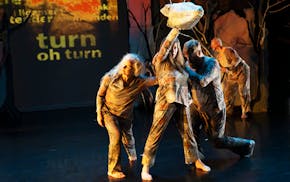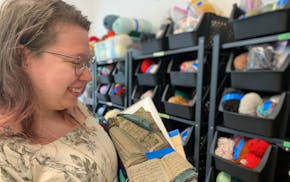Inside a beige Brooklyn Park warehouse, colorful cottons, woolens and silks are stacked to the ceiling, along with all manner of netting, leather and lace, buttons, zippers and thread.
"Overwhelming" is the most common word newcomers use to describe SR Harris' flagship store, known as the largest fabric shop in the Upper Midwest, with 30,000 square feet full of bolts, rolls, notions and remnants. There's something for every aesthetic, down to reversible sequins and chartreuse faux alligator hide.
Creative types have described this retail rhinestone as "like Costco, but fabric" and "a sewer's Disneyland." It's praised by costume designers who work nationwide. One first-time visitor reported screaming and jumping up and down like a game-show contestant when she first set foot inside. "My neck is still sore from staring up at the walls of fabric," she wrote on Yelp. "I would seriously drive 12 hours just to go there."
The Harris family business has cultivated generations of fans, some of whom pack snacks to sustain their hours-long quests for fabric. Over the past four decades, the warehouse became known for its vast inventory, deep discounts and old-school approach, including an honor-based measuring system enacted by its late founder, who buttered up customers with his charismatic banter. (One reported bon-mot: "The only thing more beautiful than this fabric is how it will look on you.")
February's news that Joann, the country's largest fabric-store chain, was going out of business, has shunted many customers of its 21 Minnesota locations to SR Harris. Not all sewers relish digging through a dim, cluttered warehouse, in fear of triggering a polarfleece avalanche. But many agree with this online reviewer's quip: "A bargain is always worth a little sweat."
Surprises galore
There is a method to the warehouse's apparent madness, owner Scott Harris noted on a recent weekday morning, as he walked through the various material sections. Satins. Brocades. Velvets. Woolens. Twills. Polyesters and rayons. Upholstery. Shirting. Cottons. Denims. Linens. Knits. Minks.
Most customers, Harris says, seek material for apparel, quilting or home decorating. But staffers have helped people shop for all sorts of projects, including making a model-boat's sail and a circus-tent diorama.
SR Harris doesn't have everything, but it feels like it might. There are 10-cent buttons sold out of bins big enough to bury a human. Bolts of cotton fabric are shelved like library books and filed by category, including Skulls, Space, Sports, Stripes, Education, Mardi Gras and Civil War. Within the cat-print selection, there are patterns with felines pushing brooms, sunning at the beach and hiding behind cellphones.
Chain fabric stores have consistent inventory, while SR Harris is all about surprises, Harris explains. He tends to buy surplus fabric from textile mills or clothing manufacturers, known as deadstock, as seasons and trends shift, or companies go out of business. (Harris is now buying inventory that Joann had ordered.) This way, SR Harris can sell luxury European-made fabrics, for example, at a fraction of their original price.
Matthew LeFebvre, a costume designer who teaches at the University of Minnesota, has been shopping at SR Harris for more than 30 years. His biggest score was fancy fabric he bought there for less than $5 a yard and later saw in New York for $80 a yard.
Even for big theaters, budgets can be tight, LeFebvre said. And SR Harris' discounts help stretch them. He knows a freelance costume designer who works nationwide and negotiates a trip to the Twin Cities to shop at SR Harris into her contracts. "I've been in Milwaukee, Arizona, a lot of different cities, and other than New York, I've never found a place that has a fabric store like this," he said.
But the thing to remember about his inventory, Harris notes, is that when a fabric is gone, it's gone. That or it's migrated to another shelf, in which case, good luck finding it again.
A family affair
Scott's father, Sid, who died last year at age 95, started a business cutting fabric for garment-makers in the 1960s, when Munsingwear and other clothiers were based in the Twin Cities. (In high school, Scott delivered fabric between his dad's shop and the garment factories on his lunch break.)
As that business dried up, Sid got into selling fabric. He moved SR Harris a few times before settling into the current warehouse in the 1980s.
After college, Scott joined the business. He opened a second, much smaller SR Harris store in Burnsville a little over a decade ago. These days, he's training in his 25-year-old son. (For the record, no one in the family sews.)
When Scott took over back-end operations, it freed up Sid, with his "gift of gab," to work the floor. "My father was a very good salesman," Scott said. "He loved to talk to people and was always interested in what they were doing and their background."
Chatting with Sid became part of the SR Harris experience. He was said to tease husbands by telling them their wives deserved all the fabric they could haul. And to gift little kids all the buttons they picked up off the floor. And ask brides shopping for wedding-dress material to bring him a slice of the cake.
As far as Scott knows, his warehouse is the only fabric retailer in the country where customers primarily cut their own material, a system his father put in place years ago. The practice frees up staff for the Sisyphean task of straightening the shelves. "People come in here and they start digging," Harris said. "It's very hard to keep up. People make a mess."
'Way more interesting'
As Harris' staff answered questions and reshelved bolts, a few shoppers picked through the leather scraps bin and got to talking. After they'd shared craftsmanship tips and photos of their projects, they moved into discussing everything from funerals to the State Fair.
"Everybody here likes to chat," said Bill Brown, as he scrutinized a scrap. "A lot of craftspeople have that in their DNA."
Brown has been coming to SR Harris since he was a university student, buying canvas for tents and backpacks. In retirement, he's taken to making custom leather belts, wallets and purses and says buying material at SR Harris saves money for his clients.
"Don't come here expecting to find exactly what you want," he advised. "Because you're gonna find something way more interesting."
Like what?
Brown's best discovery was fabric embroidered with cymbal-playing monkeys that he's used to line tote bags. It's a pattern Brown never would have thought to seek out. But once he saw it, he was inspired. "It's just the most fun piece of fabric," he said.
The man Brown was chatting with, in town from North Dakota with his wife, chimed in with a tip of his own. "If you think you're going to need five yards, you'd better buy 10, because you won't find it again."

Review: Mythical deer instigate change in a multimedia dance work

Can a prison be beautiful? And should it?

Never mind the oldies — here are 10 younger acts to see this summer in Minnesota

Review: Conrad Tao delivers a thrilling Beethoven piano concerto with the Minnesota Orchestra

